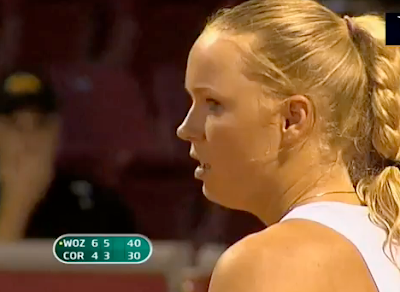The awards were handed out on Sunday evening at a special gala dinner in the presence of the guest of honour Sir James Paul McCartney, MBE, Hon RAM, FRCM who opened and closed the proceedings with yet another inevitable rendition of "Hey Jude".
 |
| Nelson Monfort (screenshot YouTube video) |
"Delicacy and tact were the trademarks of yet another fine moment in television sports journalism," the Committee noted, praising Monfort for the way in which he had managed to make one of the team, Ophélie-Cyrielle Etienne, feel completely at ease by reminding her that her mother had died recently.
Monfort, renowned for his one-note intonation and simultaneous translations skills when interviewing English-speaking athletes showed particular empathy when it came to questioning Etienne.
"We love your sensitivity," Monfort said. "You have suffered over the past year after a family bereavement. I imagine that's who you would like to dedicate this medal to tonight?"
Monford wasn't the only winner representing France Télévisions on the night though.
The whole organisation was honoured with a gold for the way in which it has so far provided balanced and objective coverage of the London Olympics, regularly interrupting events to inform viewers and commentators that the remainder of a match, bout, heat or whatever would now be continued on one of its other channels - either France 2 or France 3, depending on the schedules.
"Channel hopping has brought a delight and pleasure to millions of viewers in France," the Committee said.
"And it has ensured that no crucial moments have been missed while those at home have scrambled to find the remote control to avoid the closing credits on one channel before being treated to the opening ones on another."
Special mention was made for the way in which the men's doubles final - which featured the French pair of Michael Llodra, Jo-Wilfried Tsonga losing to the American twins Mike and Bob Bryan was shown to the exclusion of the women's singles being played at the same time.
While the odd mention was made of the manner in which Serena Williams was hammering Maria Sharapova in straight sets, the only glimpse of the game French viewers were treated to was that of Williams receiving her medal.
But the night's top award for Best Loser went to French rowers Jérémie Azou and Stany Delayre.
They were competing in the final of the men's lightweight double skulls and had reportedly made an excellent start to the race when it was brought to a halt suddenly because the British duo of Mark Hunter and Zac Purchase had problems with their boat.
Purchase's seat had slipped and as is traditional and part of the rules of rowing, he raised his hand and all the other teams stopped too.
After the restart the British went on to finish second, just behind the Danish pair of Mads Rasmussen and Rasmus Quist, while the French missed out on the podium finishing fourth behind the bronze medallists Storm Uru and Peter Taylor from New Zealand.
And it was then that the French showed their true sporting colours and sense of fair play, blaming the incident on the failure of the British team for "misaligning their boat initially because of the wind" and criticising the jury's decision "for abiding by the rules and interrupting the race."
"The other teams were stronger when the race was restarted," explained Delayre
"It's always frustrating finishing fourth and is perhaps down to us being less experienced than the other teams in appearing in an Olympic final."
Which surely brings us to the time for a song, doesn't it?
Oh, go on then.
You just know you've been itching to hear it.









